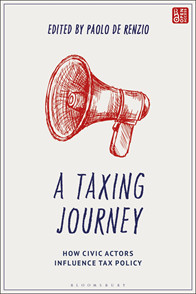
A Taxing Journey: How Civic Actors Influence Tax Policy
Paolo de Renzio (ed.)
Bloomsbury Academic, New York, NY, 2024, 240 pp., $103.50
or free open access at Bloomsbury Collections - A Taxing Journey
A Taxing Journey breaks new ground on an important topic—currently a niche area of interest but one that I wish were mainstream. The book documents how civic actors have successfully influenced tax reforms, based on case studies in countries at various stages of economic and institutional development.
Many nongovernmental and civil society organizations (CSOs) around the world—some global, some local—seek to promote worthwhile causes, such as poverty alleviation and economic development. Some concentrate on fiscal policies. A few delve into tax matters—usually focusing on international taxation. Those interested in domestic revenue mobilization—collecting revenues in a fair manner to finance basic public services such as education and health care—are rare indeed. I wish there were more. So do the editor and chapter authors of this valuable contribution, who write in a balanced manner but can on occasion be heard rooting for the protagonists of their analysis.
The case studies are disparate. A technically sophisticated group of former public officials in Guatemala holding an opaque and ineffective tax administration to account. A CSO putting a halt to tax amnesties in Mexico. A campaign for higher taxes on alcohol and tobacco in the Philippines. A pan-African research and advocacy organization using the courts to delay an agreement between Kenya and Mauritius on avoidance of double taxation (which, according to some, would have led to more, rather than less tax avoidance). A campaign against a tax on mobile money transfers and on the use of social media in Uganda. And three state-level campaigns in Massachusetts, Maine, and Minnesota, all seeking to increase taxes on the wealthy. The yellow vest (gilets jaunes) movement in France is the odd one out, given its protest nature and associated acts of violence, but it was triggered by an increase in fuel taxes shortly after the repeal of a wealth tax, and from that perspective provides an interesting comparison.
In none of these cases did the civic actors achieve complete success, whether in terms of quality or durability of outcomes. Nor were the actors always pursuing policies that a professional economist would consider efficient. In some cases, it is not even clear that the proposed policies would lead to greater equality or fairness. That does not make the book any less valuable. The world is messy, perfection is the enemy of the good, and the episodes are informative. Especially valuable are the parts relating to how the various civic actors constructed narratives and built alliances, occasionally leveraging domestic institutions (such as the courts). I admit also to taking pleasure in learning that technical expertise is an ingredient for success. Engaging in tax reform debates requires technical capacity, and successful CSOs either had former public finance officials in their ranks or collaborated with other organizations, legislators with expert staff, or government officials. Messaging, politics, and technical expertise are all necessary, and all take time to develop.
This book is part of a broader rethinking about tax policy, which moves away from excessive emphasis on economic efficiency and recognizes that fairness is at the core of what voters care about. The book shows that civic actors can push for more equitable taxation or resist inequitable taxation.
Readers expecting a methodologically tight analysis and conclusive results will be disappointed. Those interested in a balanced narrative on well-chosen, informative episodes where civic actors made a difference will draw their own conclusions. As acknowledged by Paolo de Renzio and Jason Lakin in their introductory chapter, the cases were selected because they were successful, at least in part. The objective was not to establish causality. Nor was it to look for lessons from failures—deliberately omitted. Rather, the project was intended to inspire activists, practitioners, and researchers—to propose equitable tax reforms and to conduct further analysis on how and when civic actors can influence tax policy and make it fairer. Cheers to that.
Opinions expressed in articles and other materials are those of the authors; they do not necessarily reflect IMF policy.









